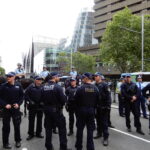Is the COVID-19 Vaccine Rollout a Step in the Right Direction?

When about 500 protesters gathered in Fawkner Park in South Yarra, Melbourne over the weekend, there was already tension in the air. The police presence was strong, with at least a hundred officers on the ground, a police helicopter overhead and mounted officers.
As the protesters dispersed from the formal speeches and began to march the streets, chanting “freedom” and “we will not comply” clashes with police got ugly. Fifteen people were issued fines for breaching the Chief Health Officer’s directions and a further five people charged on summons for resisting arrest, hindering police and refusing to provide their details.
A photographer and reporter from the Herald Sun were handcuffed and fined after covering the protests, prompting another journalist to publicly remark that both the Andrews’ Government and Victoria Police have been “incredibly hostile” throughout the pandemic to anybody questioning the wisdom of their leadership.
Both the New South Wales and Victorian Police forces have received significant criticism for heavy-handed, inconsistent policing over the past several months.
In Victoria, policing has become so extreme during the COVID-19 pandemic that trust in the Victorian Police Force has fallen markedly.
Last year, an independent Roy Morgan Poll showed that the number of people who rate the honesty and ethical standards of Victoria’s Police Force had declined to 42% from a previous ranking of 76%.
‘My body my choice’
Thousands of people marched in protests right around Australia, taking a stand against the national vaccination rollout which is now underway.
Prime Minister Scott Morrison headlined the media over the weekend with an obligatory PR photo of himself getting the vaccination, along with claims that he was getting it first, to demonstrate to Australians that it is ‘safe.’
And despite some protesters spouting conspiracy theories and claims of an ‘invisible pandemic’, the core issue here is just that — a genuine concern that the vaccine has been rushed through and there are still uncertainties about its safety and effectiveness.
The fact is, many Australians are just not willing to have the vaccine – yet. Over the weekend, many of those who chose to protest were simply exercising their democratic right to stand up for personal freedom and choice.
Medical coercion?
The Federal Government has said the vaccine program will not be mandatory, but there’s other rhetoric floating around such as comments from Bill Shorten over the weekend that ‘vaccines are important to the survival of sporting events, the travel industry and live events,’ which emphasise a lot of vagueness at a time when people are seeking clarity.
The Morrison Government itself has also said that some workplaces that are considered “high-risk” may insist on employees getting the shot.
For anyone who doesn’t want to have the vaccine, or who would prefer to wait a little longer, some of this sounds a lot like coercion.
While the Federal Government sets overall policy, the States and Territories will manage rollout.
The States and Territories are expected to agree to a uniform set of national standards prior to the vaccine’s rollout, planned for the end of February, although there’s no sign of it yet, and the vaccination rollout has already begun.
While national standards are vital, it won’t necessarily stop the States and Territories from making their own regulations, and as has been demonstrated so many times throughout the pandemic, jurisdiction-based public health legislation has the potential to create even more confusion.
More clarity is needed
At one point several weeks ago, NSW Premier Gladys Berejiklian, said it’s possible businesses could make their own decisions about the vaccine. She also mooted that entrance into Government buildings or other public venues like pubs and clubs may not be possible without proof of having had the vaccine.
In New South Wales, under the current public health emergency laws, public health orders don’t have to be debated in parliament, which means they are not required to face the rigour of debate, approval and oversight of the usual law-making process.
And this could have serious repercussions, because rules around under what circumstances a vaccine is required must balance protections for public health with personal freedom of choice.
The Australian Human Rights Commissioner has said that it is ‘legitimate’ to encourage people to get a vaccine, but whether a particular ‘requirement’ for the vaccine is an infringement of human rights law, depends very much on individual circumstances.
Ultimately, what this means is that it is entirely possible that much of the debate about the vaccine and the right to retain personal medical choice could end up in the courts in due course.







